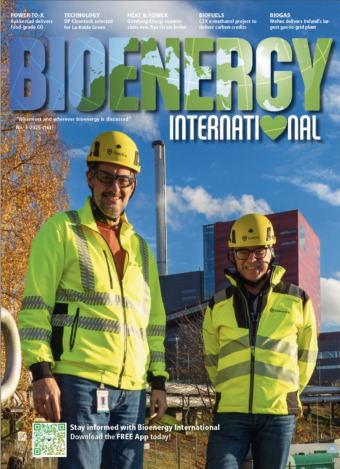Portugal is the eighth EU Member State to celebrate its National Bioenergy Day on this year's listing of Bioenergy Europe's National Bioenergy Days sharing the day with Romania. Forests cover around 36 percent or just over 3.31 million hectares of the land area of which the introduced species Eucalyptus globulus plays a significant role. Residues from forestry- and wood processing industries are powering state-of the-art combined heat and power plants replacing fossil fuels.
The European Bioenergy Day campaign aims to shed light on the increasingly central role that sustainable biomass is playing in the EU’s energy transition.
According to Bioenergy Europe, bioenergy is a vital component of the EU’s energy system and economy, producing 85 percent of the EU’s renewable heat, representing alone one-third of renewable energy sector jobs, and saving enough carbon dioxide (CO2) emissions to cover the annual emissions of Spain.
Awareness campaign
The campaign provides key facts on biomass and the bioenergy industry and celebrates people, projects, and companies contributing to achieving European carbon neutrality.
In the past years, Bioenergy Europe launched the European Bioenergy Day campaign to provide tangible, first-hand examples of how bioenergy impacts the lives of EU citizens.
Facts
Background European Bioenergy Day

First launched in 2018, the European Bioenergy Day campaign is powered by Bioenergy Europe and relayed across Europe by both national and international partners supporting the belief that bioenergy is more than a renewable energy source, but a reliable path that will lead Europe to achieve its renewable energy transition.
Each year, Bioenergy Europe calculates the Bioenergy Day of the European Union (EU) and each Member State, showing how long a Member State or the EU could meet their energy needs using only bioenergy until the end of the year.
Every National Bioenergy Day is accompanied by a story, showcasing the impact of bioenergy in the EU, whereas the European Bioenergy Day is highlighted at the annual European Bioenergy Future conference.
This year’s motto is “Our Shared Steps Towards the Energy Transition” and the 2024 European Bioenergy Day campaign aims to share these stories, highlighting how bioenergy supports the local (bio)economy, fosters innovation, and boosts the EU’s competitiveness.

As the EU advances towards its climate goals, bioenergy continues to expand its role as a key ally in the transition.
The new EU mandate will address critical issues such as climate change, energy security, and the rising cost of living.
In this context, bioenergy is a key ally for the EU’s economy, sustainability, and energy security.
It offers a viable alternative to fossil fuels and it is a key player in carbon dioxide removal (CDR) technology thanks to bioenergy with carbon capture and storage (BECCS), and biochar through pyrolysis with carbon capture and storage (PyCCS).
Eucalyptus a major bioenergy enabler
According to World Bank data, just over one-third (36.2 percent 2021) of Portugal’s 92,212 km2 land area is covered with forest – 3.31 million hectares (ha).
According to the latest Forest National Inventory (2026) Eucalyptus globulus (Eucalyptus), a non-native species, represents 26.2 percent of the Portuguese forest area, covering 845,000 ha.
A legacy of the World Bank program of Eucalyptus globulus reforestation program, Eucalyptus is almost exclusively planted for pulp and paper and wood-based panelboard industries.

Apart from being non-native, Eucalyptus would seem susceptible to wildfire, a downside laid bare in recent years.
Be that as it may, these sectors, in particular the former, are net exporters of biopower to the national grid, through the use of process residues such as bark, wood waste, and black liquor in recovery boilers and combined heat and power (CHP) units at the pulp mills. The power sector is an important consumer of biomass.
Currently, Portugal has just over 636 MW of biomass-fired installed capacity, with another 173 MW of capacity if biogas (83 MW) and waste-to-energy (90 MW) are included. Combined, the three technologies account for just over 5 percent of installed renewable power capacity.
 Logging residues from forest management in Portugal are already valorized to some extent as are wood processing residues – Portugal is a significant wood pellet producer.
Logging residues from forest management in Portugal are already valorized to some extent as are wood processing residues – Portugal is a significant wood pellet producer.
According to Bioenergy International’s World of Pellets Map 2024, Portugal had 31 pellet plants operational in 2023 with a total installed capacity of just over 1.7 million tonnes, of which 23 plants (≈ 1.3 million tonnes) were ENplus certified.
In 2019, most (53 percent) of the energy from firewood, forest and plant residues, wood pellets, and other agglomerates was consumed in the residential sector according to Direção Geral de Energia e Geologia (DGEG), the Bioenergy Europe’s 2024 success story for Portugal a case in point.



